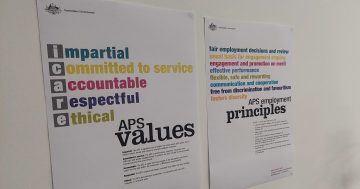
There is a growing shortage of much-needed employees across the APS. Photo: File.
The Australian Public Service is facing a skills crisis, with agencies across the board unable to fill roles and keep good staff.
In what can only be described as an employees’ job market, the current situation is leaving thousands of positions vacant and key jobs being tasked to already overstretched workers.
Applicants have the luxury of choosing between multiple job offers, often opting for higher-paid private sector opportunities.
Compounding the problem is the growing trend to move within the sector, with staff leaving one agency for a more dynamic and better-paying job in another agency.
“That is just moving the APS’s problem around within itself,” one agency boss told Region.
“It’s good for the agency that gets the new body, and it’s good for that employee, but it’s not at all good for the overall service. It’s robbing Peter to pay Paul and this is a real crisis in the making.”
The recent Federal Budget has provided for almost 8,000 extra APS positions to be filled as a matter of urgency, but insiders say that won’t solve the problem.
Higher wages and greater workplace flexibility elsewhere are leaving the APS with many unfilled roles and a gaping hole in its skills base.
“We might not be able to fill those extra positions because the public service is currently not being seen as an attractive and rewarding career option,” a senior APS contact told Region.
“Jobseekers with any level of skill and talent are being spoilt for choice, and they’re not choosing us.”
The Australian Public Service Commission provided a detailed response to Region when asked about the situation.
“The Australian Public Service, along with other private and public sector employers, is facing sustained workforce attraction and retention pressures,” an APSC spokesperson said.
“It is responding to wider labour market skills shortages in emerging technologies and specialist areas due to historic low unemployment rates and changing employee expectations.
“Delivering for Tomorrow: APS Workforce Strategy 2025 identifies priorities for shaping the APS workforce to tackle immediate and emerging challenges, and there is a focused effort to position the APS as a model employer. This includes ensuring the APS offers a place to work and build a career that is inclusive, respectful and offers greater flexibility and a greater sense of purpose.
“To support implementation of the strategy, the Workforce Planning Centre for Excellence in the APSC is supporting agencies to develop robust workforce planning approaches and capability and secretaries are accelerating action to improve the APS employee value proposition including a new approach to location, streamlined hiring practices and efforts to address critical skill gaps.
“The government has committed to a reduction in the fragmentation of APS pay and conditions and is currently consulting with agencies, employees and their representatives on an appropriate model for service-wide bargaining. This will all contribute to strengthening the position of the APS in the labour market as an employer of choice.”
Compounding the problem, the government is trying to lessen the massive spend on external consultants and contract labour to the APS.
Labor is fast coming to terms with the fact that it’s hard to reduce the number of contractors when there are not enough actual jobs being taken up inside the service.
Each APS agency is responsible for managing its own staffing levels and budgets, but almost all of them are struggling to fill key roles.
Defence has a particular crisis, with Defence Minister Richard Marles noting just this week that one in 20 positions remain unfilled.
Across Defence’s uniform and civilian workforce, there is a shortfall of 4000 personnel. That’s almost 3000 down in the Australian Defence Force and about 1000 down in the public service department.
Recruitment efforts are not working to the desired level, the Minister said in a speech on Monday.
“What is completely clear is that urgent action is required if we are to respond to our more challenging strategic environment because right now we have a defence personnel crisis,” Mr Marles said.




















